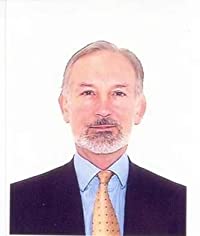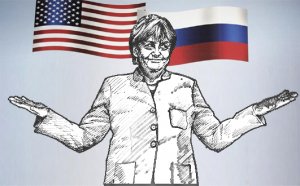
Gilbert Doctorow, Ph.D.
Gilbert Doctorow is a Research Fellow of the American University in Moscow
When businesses understand how their interests can be best defended by civil society acting through a Committee on East West Accord to roll back the sanctions, I expect they will give a sympathetic hearing to our request for funding. Read on….
In recent weeks the question of whether we have a New Cold War has ceased to generate much controversy: it is accepted as a fait accompli, a fact of life.At the same time, nearly all our journalists remind their audience that the present confrontation between Russia and the West is the worst crisis since the end of the original Cold War in 1989.
I beg to differ with that characterization: I would say it is among the worst crises since thebeginningof the original Cold War. We have approached the risk level of the Cuban Missile Crisis, even if the political leadership in Washington and Brussels publicly abjure any direct military actions and Russia publicly speaks only of diplomatic recourse to ease the crisis.What remains is the very real threat of miscalculation, misinterpretation by either side of the actions and intentions of the other side and third party-client state provocations that engage the principals in a fight they say they don’t want. This takes place against a background of vituperative information war. And in the United States, the confrontation has brought out a new McCarthyism which denounces calls to reason as toadyism to the Kremlin, which enforces silence of naysayers in the media and on university campuses, which in the end defeats the pluralism which has been the foundation of democracy.
Without endeavoring to apportion blame for the ongoing information war, one alarming fact emerges from the American and European sides: the apparent loss of all sense of fear of nuclear holocaust, a totally unfounded complacency. Our senior statesmen and politicians behave as if the Star Wars mythology of the 1980s has become reality and an entirely unproven ‘iron dome’ were in place.
The false sense of security is fed by denigration of Russia as a whole, which arose in sync with the campaign of vilifying the Russian President.The country is just a gas station, to quote Senator McCain. It is nothing more than a regional bully, not a world power, to quote Barack Obama. It makes nothing that anyone would want to buy, again from the American President. Its economy is failing, its population is falling.
In this belittlement of Russia we have a cardinal difference from the days of the original Cold War, when Russia/the USSR was morally condemned but always respected or feared as posing an existential threat to the United States and Europe. Indeed, its military prowess was then systematically exaggerated for domestic political and budgeting purposes in Washington.
The doctrine of Mutually Assured Destruction kept the peace through the original Cold War. In effect what we have today on the US-European side is a belief in survivability of nuclear attack, and a First Strike mentality has taken hold. This matches only too well the latest Russian military doctrine on the acceptability of using tactical nuclear weapons if it is outmatched by opposing conventional weapons.These are the preconditions for a doomsday scenario that the best minds of East and West labored to prevent during the original Cold War.
And unlike those days, the broad public seems to be oblivious to the lurking dangers. We have no SANE. Until recently, we have had but pale vestiges of the grass roots movements that back then mobilized against the threat of nuclear war. We are in the new 21stcentury, safe from the primitive behavioral and thinking patterns of our forebears.Or are we?
In this audience, it is likely we hold similar positions on who is responsible for the current confrontation over Ukraine. We likely have similar positions over who started the information war. In my own polemical writings, I have identified the thinkers and implementers of the War Party in Washington.But outside this hall, and particularly in the US and Europe, the blame game is rancorous and in the end unproductive.
Therefore my proposal is that we put this search for Truth aside, change course and concentrate on what can unite people as we seek to restore correct priorities in international relations with peaceful resolution of disputes at the top, with due attention to the security concerns of all sides such as underpinned the move for a new security architecture in Europe which was the main project of the Medvedev presidency but which gained no traction at the time.
It is in this spirit that I come to you today with the proposal to re-create a platform for a common sense approach to relations with Russia that was founded in Washington in 1974 and closed its doors in 1992 when the Cold War had ceased to exist and a golden age of friendly and constructive international relationships with Russia seemed to have arrived.
What I would like to do in my remaining time at the microphone is to explain why we have chosen precisely the Committee on East West Accord for resurrection, what are lessons of that organizations’ successes and ultimate failure, what are the different challenges and opportunities we face today which must define the structure and modus operandi of the new Committee.
I do not deny that there was a nostalgia factor operative when both Professor Stephen Cohen and I initially discussed recreation of the Committee. It was not over loss of our youth. Indeed, we both were active members during the 1970s and he became quite visible there during the 1980s.It was over the absence today of the civil discourse about Russia prevailing back then.
The Committee is precisely a marker. It gives us orientation as we seek a new, more effective way forward.
The American Committee on East-West relations was set up in 1974 after the passage of the Jackson-Vanik amendment in Congress marked a turning point against the policy of détente which had been rolled out by President Richard Nixon. The challenge to détente came from the founders of what would later be known as the Neoconservatives.
It is essential to remember that at that time, in the 1970s, a substantial part of American elites was in favor of normalizing relations with Russia/USSR. The policy had the backing of the Oval Office. The President actively encouraged American business to go to Moscow and enter the Russian market.
When this policy met a major defeat in Congress, leaders of big business, big banking came forward to sponsor a Committee to lobby Capitol Hill on their behalf and to educate the broad public on the benefits of trade with the USSR in terms of jobs and national interest.They joined some leading academics and retired statesmen and diplomats, the most notable of whom was George Kennan, the author of the Containment Policy that guided American conduct towards the USSR from the start of the Cold War.
The Board of the American Committee was upper crust and its mission was to engage with fellow members of the Establishment to negotiate a better policy on Russia.In the person of George Kennan, there was an explicit indifference to The People, whose interference in the conduct of foreign policy was considered highly undesirable.Thus, the American Committee had shallow roots in American political life and operated only in rarified levels at the top.
When the Reagan administration came to power and university professors flocked to the Committee to find an outlet for their opposition to Star Wars, the governing Board overruled the proposals of Steve Cohen and rejected the idea of making common cause with the grass roots movements opposing nuclear war, opposing the American build-up of rockets in Western Europe. In any case, its business sponsors like Donald Kendall, Chairman of Pepsico, were Reagan Republicans and opposed any partisanship that criticized the President.
For those of you who would like to see the details behind the broad picture I have just painted, I suggest you read a 2013 study of the American Committee by a master’s degree candidate of Ohio University which is downloadable for free from the internet.( Benjamin Wallace, Ohio University, MA thesis, May 2013)
Today the American political landscape has changed dramatically from the 1970s and 1980s. The elites are 99.9% behind a bipartisan policy that is entirely Russophobe and which taps into a strong current of American political beliefs, Wilsonian Idealism or Liberalism.
The cheerleaders of the anti-Russian movement feeding the press daily are the American administration itself, its press officers in the White House, the State Department. The only challenge to this prevailing wisdom is coming from the fringes on the Right and on the Left, with greater determination and appeal on the Right – among the populists of the Tea Party.The same can also be said of the political landscape of the EU.
As a practical matter this means that it will be much more difficult to find sponsorship money to establish a platform for détente today. Business is wary of appearing disloyal and unpatriotic.However, acting through its associations, business is not muzzled. I think of the full page advertisement against sanctions on Russia in the New York Times this past spring paid for by the American Chamber of Commerce and of the recent public statements of the Association of European Businesses condemning the sanctions policy. Therefore, when businesses understand how their interests can be best defended by civil society itself in the person of a Committee on East West Accord, I expect they will give a sympathetic hearing to our request for funding.
Another lesson of our times is that our Committee will have to reach out to existing grass roots movements to form a popular coalition that brings pressure to bear on our political classes from below, without the hope for armchair discussions over a whiskey behind closed doors. The recent demonstrations against EU policy on Russia in Germany give hope that young people in particular are ready to hear a different narrative from what they get in the mass media and are sympathetic to the call for peace, not war.
Another change in the political realities of today is the existence of the EU. Back in the 1970s and 80s, there was great truth in Henry Kissinger’s remark that he did not know where to turn to find an interlocutor for Europe in foreign policy discussions. Today the locus of foreign policy power in Europe is in Brussels.
This has been understood perfectly by our friends on the other side of the political barricade. I think of the very effective campaign in the halls of the European Parliament led by Bill Browder in 2013 on behalf of a European ‘Magnitsky Act.’The result has been the docile acquiescence of the European heads of state and Parliamentarians in the imposition of senseless and ultimately dangerous economic sanctions on Russia. We must take a page from the playbook of our opponents and give equal time to lobbying and educational work in Europe.
Finally, the Russia of today presents a starkly different political landscape from the USSR of the 1970s and 80s, with a newly emerged and vibrant civil society that constitutes our natural counterpart-interlocutor in any effort to build bridges and establish reasonable and just state-to-state relations.



_jpg/250px-ElbeDay1945_(NARA_ww2-121).jpg)









